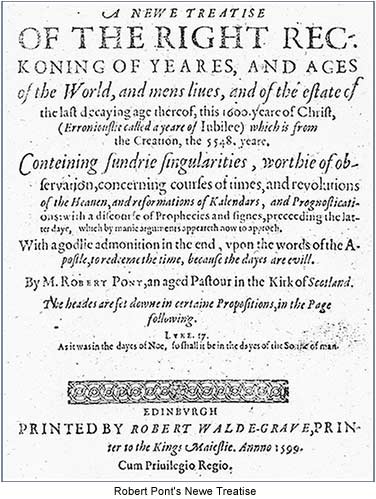Pont maps | Pont texts | biographies | history | subjects | further reading
Pont Maps of Scotland, ca. 1583-1614 - Biographies
Robert Pont, Timothy Pont's father (1524-1606) by Christopher
Fleet

Robert Pont was born at or near Culross, and studied philosophy at
St Andrews University before perhaps going on to study law at one of
the Continental universities. By the 1550s he appears as an elder of
the kirk session in St Andrews, and as commissioner for St Andrews;
he was present at the first meeting of the General Assembly of the reformers
in 1560. As a close associate of John Knox, he was entrusted with revising
the first Book of Discipline (1561), and was chosen by Knox to communicate
his last wishes to the general assembly (1572). In the meantime, he
had served as Minister of Dunblane and Dunkeld, provost of Trinity College,
Edinburgh (1571), and as Commissioner of Moray, Inverness and Banff,
establishing reformed kirks and ministers in these regions. In this
latter role, he professed his inability 'in respect of the laike of
the Irish tongue'(1) to carry out his duties properly,
but his commissions were renewed until 1574. From this time, he became
minister of St Cuthbert's or the West Kirk in Edinburgh, and a central
figure in the General Assembly, holding the position of moderator six
times through a turbulent political period.![]()
![]()
Whilst Robert Pont's political and literary career was dominated by
his ecclesiastical mission, his influence extended into civil and government
activities. He was made a senator of the College of Justice in 1572,
and when, in the next year, the General Assembly prohibited ministers
from accepting such civil appointments he alone was exempted from this
rule. In 1578 he accompanied the English ambassador to Stirling to arrange
an agreement between the faction of the 4th Earl of Morton, and the
faction of Atholl and Argyll. His outspoken opposition to the Black
Acts (1584), which sought to assert Crown supremacy over all estates,
as well as increasing episcopalian power, lost him his seat on the bench,
and forced him briefly into exile. However, the following year he returned
to the fray to oppose releasing Patrick Adamson, archbishop of St Andrews,
from his sentence of excommunication. When James VI nominated him Bishop
of Caithness in 1587, Pont tactfully referred the matter to the General
Assembly, who blocked the appointment, the office being 'not agreeable
to the word of God'.(2) In the following years, Pont
was involved in several commissions for 'stamping out popery', instigating
proceedings against papists and planting kirks 'from the Dee to the
diocese of Caithness'(3).![]()
![]()
![]()
![]()
By the 1590s Pont was a senior statesman, advising 'in all matters
concerning the weal of the kirk'.(4) In 1599 he published
A Newe Treatise on the Right Reckoning of Yeares and Ages of the
World..., a profound Protestant vision of the past and future,.
Amongst other things this reappraised the calculation of time and Jubilees
through an integration of celestial cycles, number mysticism, prophecy
and theology, including an account of the forthcoming apocalypse, 'for
the days are evill'. However, as noted by Williamson,(5)
this work was certainly in the spirit of the times, and the 'Reverend
Robert Pont spoke with great learning, vast experience, and enormous
authority'. He is also credited with correctly prophesising the death
of Queen Elizabeth in 1603, requesting a special visit to King James
to proclaim him as 'King of Great Britain, France and Ireland'. The
King replied: 'I still told you, you would go distracted with your learning,
and now I see you are so'. 'No, no', replied Pont, 'the thing is certain.
She is dead, I assure you'. And so it was (6). He
was also a vociferous advocate of the union with England, finally penning
his De Unione Britanniae (1604) a year after the regal union.(7)
Thrice married, Pont had five sons and three daughters: his eldest son
Timothy, along with Zachary, Catherine, and Helen, were all by his first
wife, Catherine.
![]()
| (1) | Calderwood, D., The history of the Kirk of Scotland (Edinburgh, 1843), Vol.II, 244. | back |
| (2) | Ibid., Vol.IV, 625. | back |
| (3) | Dictionary of National Biography. | back |
| (4) | Calderwood, Vol. IV, 645. | back |
| (5) | Williamson, AH. Scottish national consciousness in the age of James VI (Edinburgh, 1979) and Williamson, AH. Number and national consciousness: the Edinburgh mathematicians and Scottish political culture at the union of the crowns, in Scots and Britons, ed. by R. Mason (Cambridge, 1994) 187-212. | back |
| (6) | Wodrow, R., Analecta (Edinburgh, 1842), Vol. II, 341-2. | back |
| (7) | Galloway, B. R. & Levack, B. P., The Jacobean Union (Edinburgh, 1985). | back |
